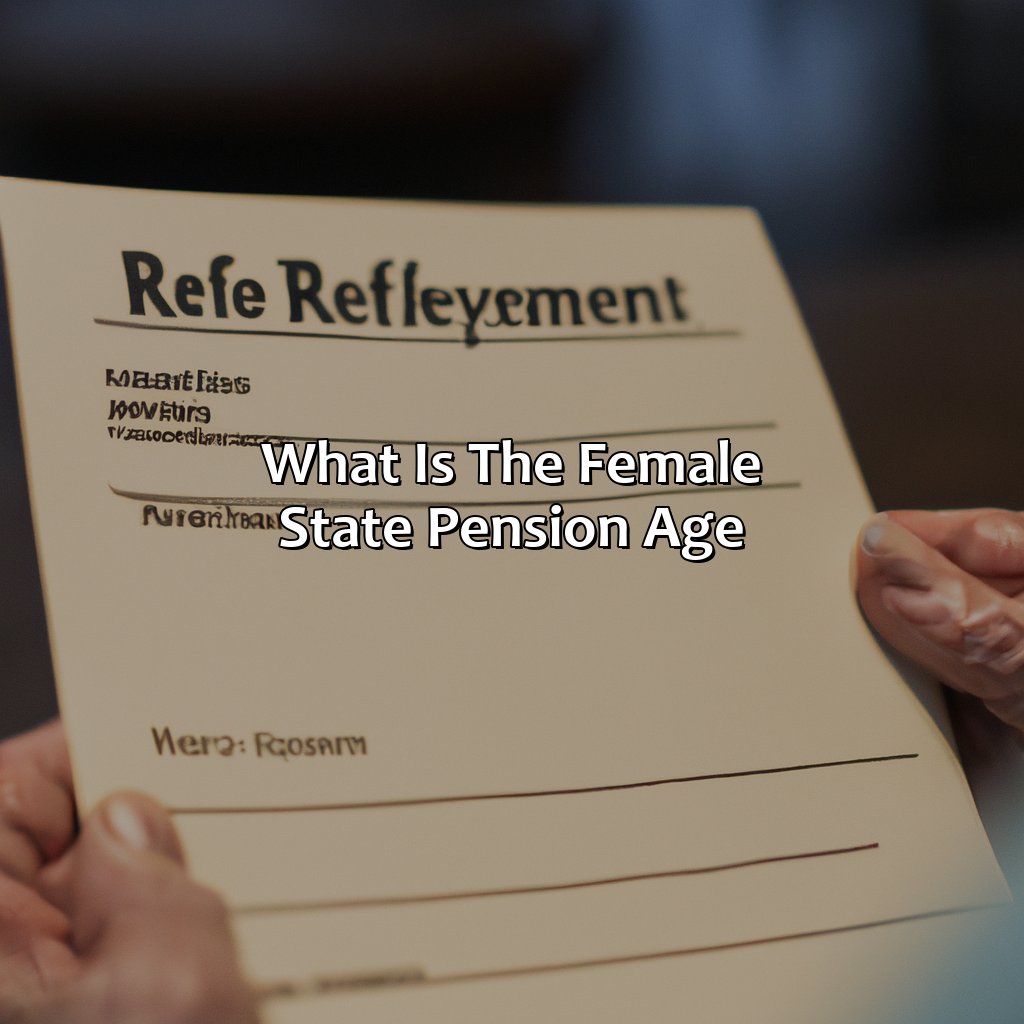What Is The Female State Pension Age?
Key Takeaway:
- The State Pension Age is the age at which individuals can start receiving their state pension. It is determined based on various factors such as birth date and national insurance contributions.
- Changes to the State Pension Age have led to an increase in the Female State Pension Age. Previously, women could receive their state pension at age 60, but now the age is gradually increasing and will eventually reach 65, aligning it with the Male State Pension Age.
- Exceptions to the Female State Pension Age include the Widow’s State Pension and Bereavement Benefits, which provide financial support to widows and bereaved families.
Don’t fall behind on your retirement planning! You deserve to know what the female state pension age is to make the best decision for your future. This article will explain the recent changes in the female state pension age and why it is important.
Understanding the State Pension Age
Understand State Pension Age? It’s important to grasp the definition of State Pension and how State Pension Age changes. These changes influence when you start receiving your pension. So, let’s explore the sub-sections. These will give you a better insight into State Pension Age and its effects on your pension.
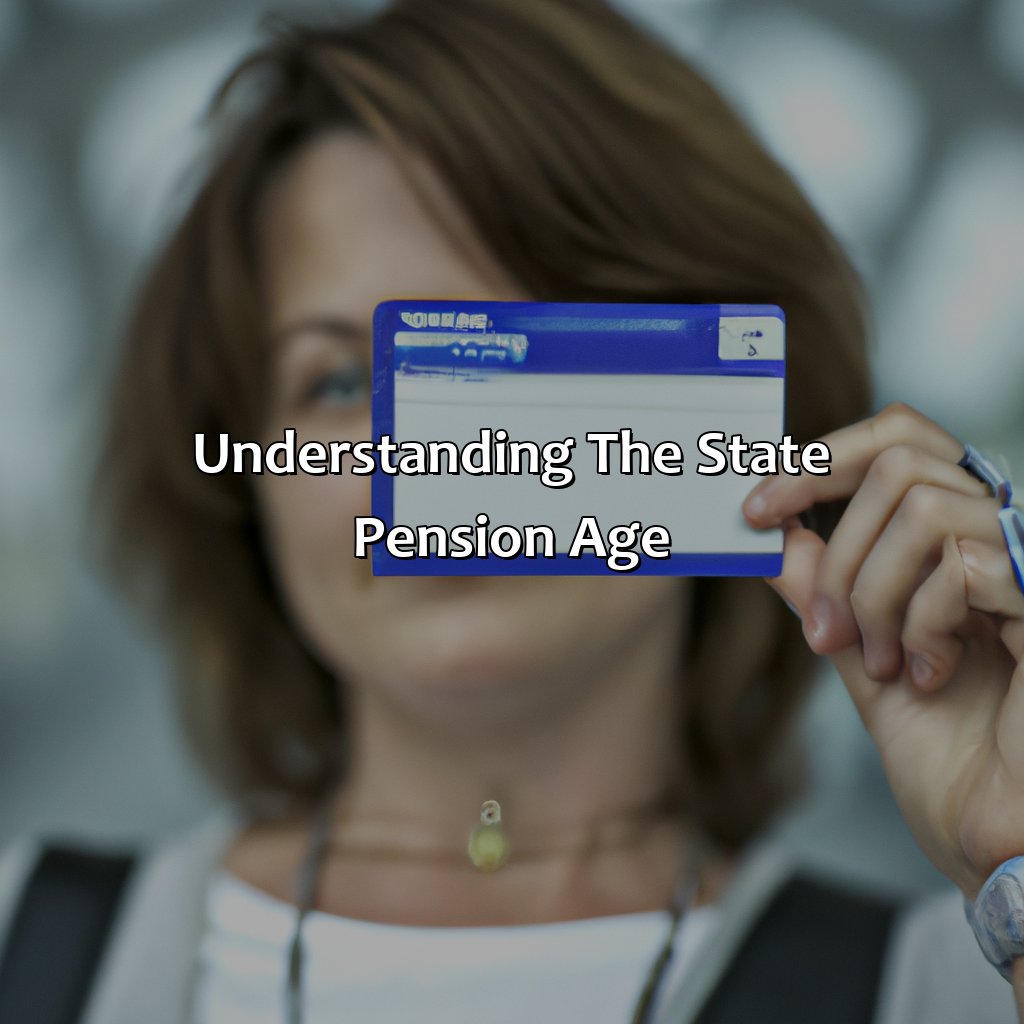
Image credits: retiregenz.com by Yuval Arnold
Definition of State Pension
The state pension is a regular payment from the UK government to individuals of eligible age who have paid national insurance contributions. The purpose of the pension is to help supplement income during retirement and provide financial security.
As of October 2021, the state pension age for both men and women in the UK is 66. However, The female state pension age has undergone significant changes in recent years due to gender equality reforms. Previously, women were able to claim their state pensions earlier than men, at the age of 60. However, following changes made in 2010, women’s state pension age began increasing gradually until it reached 65 by November 2018.
It’s important to note that some women may still be affected by this change and their state pension may not start automatically when they reach their current pensionable age. Women born between April 6th, 1950 and May 5th, 1953 are most likely to be affected by these changes and should check their eligibility carefully. To learn more about when you can collect your pension, visit our website.
According to a report published by This Is Money in September 2021, approximately two million women born in the nineteen-fifties have been affected by changes to the state pension age. If you’re wondering what date Canada Pension is paid, you can find more information on RetireGenZ.
Looks like we’ll be working for the state pension and the fountain of youth at the same time.
Changes in State Pension Age
The evolution of eligibility criteria for State Pension has resulted in several Changes to the Qualifying Age. This modification aims to align the pensionable age with a person’s financial productivity and life expectancy, ensuring fair rewards for pension contributions and economic sustainability.
Women born between 1950-1960 are most affected by the Changes in State Pension Age, facing an increase from 60 to 66 years within ten years. If you’re wondering what is the pension age, it’s important to know that it varies depending on your birth year and gender.
The rationale behind this change was a phased transition from unequal State Pension Age policy for men and women. The European Court of Justice declared this distinction as discriminatory in 1990, leading to various equality measures initiated by the UK government, including the acceleration of women’s pension age parity with that of men. Additionally, this change responds to the rising costs of supporting long-term State Pensions and increased longevity.
It is necessary to recognize employment barriers, wage disparities, and caring responsibilities one may encounter at midlife while highlighting individual investment strategies for retirement planning. Starting early contributions towards additional pension schemes or lifetime ISA can provide financial security during retirement beyond prescribed state provisions. Learn more about what age you can get your pension and how to plan for it.
Investing in personal career development opportunities and raising awareness on advocacy against gender bias can promote equal opportunities at work and lifelong wellbeing.
Looks like women have to wait even longer to join the ‘golden years’ club – the state pension age for females is creeping up like a cat burglar in the night.
Female State Pension Age
To grasp the alteration in the female state pension age, dive into the old and the current female state pension age. Develop a profound understanding of these components to comprehend more deeply the effect of the shift in female state pension age on women’s lives.
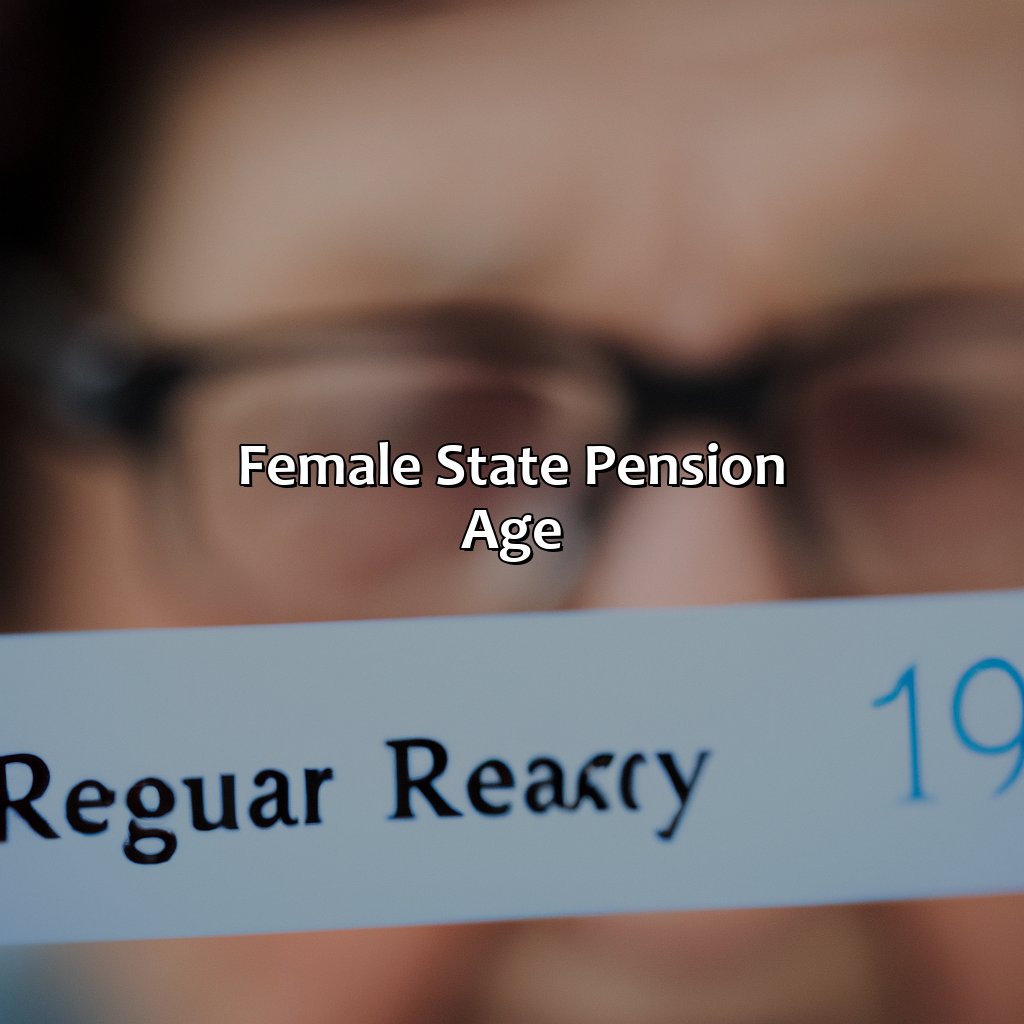
Image credits: retiregenz.com by Yuval Duncun
Previous Female State Pension Age
The previous retirement age for women in the UK was lower than men’s. However, this changed in recent years as the government decided to gradually increase the female state pension age to match that of men.
| Year | Female State Pension Age |
|---|---|
| 2010-2016 | 60 |
| 2016-2020 | 60-65 (depending on birthdate) |
| From 2020 onwards | 66 (for both men and women) |
Additionally, some women are affected by changes to the rules around eligibility for state pension, which also impact their ability to claim. It is important for women to stay informed about these changes and plan accordingly for their retirement.
One suggestion is for women approaching retirement age to consider seeking financial advice from a professional. This can help them understand their options and ensure they have made adequate preparations. Another suggestion is for younger women to start saving early so that they can have a comfortable retirement when they reach state pension age. By making small adjustments now, women can ensure a better financial future later on.
Looks like women have to wait a little longer to join the retirement party, as the current female state pension age is gradually increasing.
Current Female State Pension Age
The current age for women to claim state pension in the UK varies depending on when they were born. Those born before 6th April 1950 can claim state pension at the age of 60, while those born between 6th April 1950 and 5th December 1953 have a state pension age of between 60 and 65 years. State pension age is gradually increasing for women born after this period, reaching the same level as men’s pension age (currently 66) by October 2020.
It is important to note that these changes were introduced in an attempt to create a more sustainable pensions system in the long term. Although some people may feel that they have been unfairly impacted by having their retirement ages increased, it is worth noting that the changes will help ensure that future generations are able to receive a reasonable income throughout retirement.
Pro Tip: It’s always worth checking how much is the old age pension in Canada and your expected pension age well in advance of your expected retirement date, as this will allow you time to plan your finances and make any necessary adjustments accordingly.
How much is the old age pension in Canada?
Why worry about factors affecting female state pension age when you can just pour yourself a glass of wine and pretend you’ll never age?
Factors Affecting Female State Pension Age
In order to know the factors which influence your state pension age as a female, this section, titled ‘Factors Affecting Female State Pension Age’ examines two sub-sections. These are:
- Date of Birth
- National Insurance Contribution
By studying these two factors, you’ll get a clearer understanding of how they shape your state pension age. This will help you plan your financial future wisely.
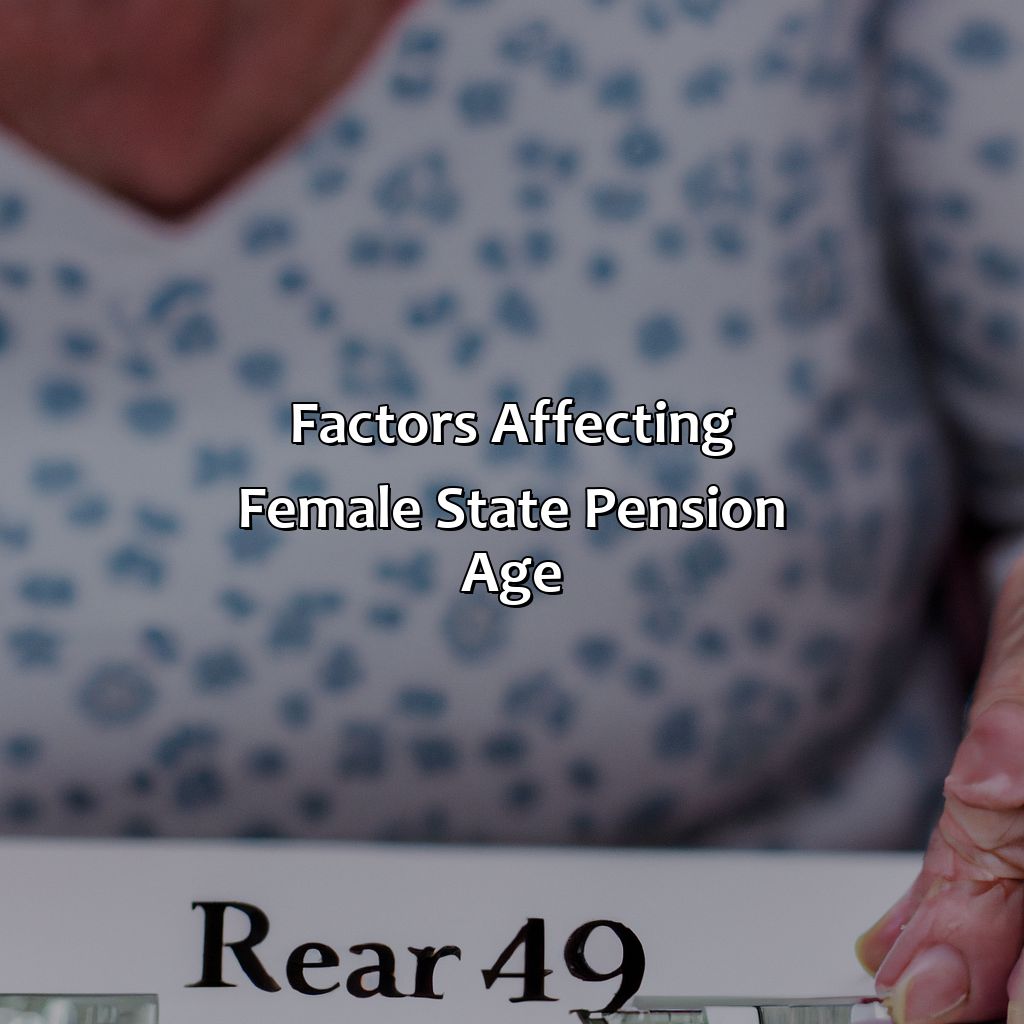
Image credits: retiregenz.com by Yuval Washington
Date of Birth
Women’s Age of Eligibility for State Pension
The age at which women can receive state pension in the UK is influenced by several factors. This includes their date of birth, employment history, and National Insurance contributions. Women wondering “What age do I get my state pension?” can find more information on RetireGenZ. Women born after April 6th, 1950 face a gradual increase in their state pension age from 60 to 65 years.
Additionally, women who have had career breaks or were not working may not have enough qualifying years of National Insurance contributions, which could affect their eligibility for a full state pension. Recent changes to the rules have made it possible for some women to claim backdated payments if they were not notified properly about changes to their state pension age. Find out how many years NI for full pension here.
It is worth noting that there has been controversy surrounding the changes to the female state pension age as many women claimed they were not given sufficient notice or time to plan for retirement.
In summary, understanding how much the old age pension in New Zealand is essential for financial planning and securing your future income during retirement.
National Insurance Contribution: If only the government had contributed to our retirement funds as enthusiastically as we do to their expenses.
National Insurance Contribution
The concept of contributing to the state pension fund is an essential part of maintaining your financial security in retirement. This contribution, commonly known as National Insurance payments, is required from individuals who are eligible to work in the UK. The contributions are then used by the government to fund state pensions and other social security programs.
Continuing with the national insurance contributions, it’s not just about providing money for state pension; the system has evolved into more than that and currently includes other social welfare benefits like maternity allowance, bereavement payment, jobseeker’s allowance amongst others.
It is vital to note that different factors such as age, income level or employment status affect both the amount of National Insurance contribution one makes and one’s eligibility for various benefits from which any individual would benefit from.
As we plan towards ensuring our financial stability in retirement, it’s crucial to consider making adequate provision for national insurance contribution so as not to miss out on any entitlements available. Start contributing now!
Even exceptions to the female state pension age can’t escape the inevitable fact that retirement is just a nice way of saying ‘you’re old now‘.
Exceptions to Female State Pension Age
Learn about the exceptions for female state pension age! Check out “What is the Female State Pension Age?” Two subsections explain it. These are:
- Widow’s State Pension
- Bereavement Benefits
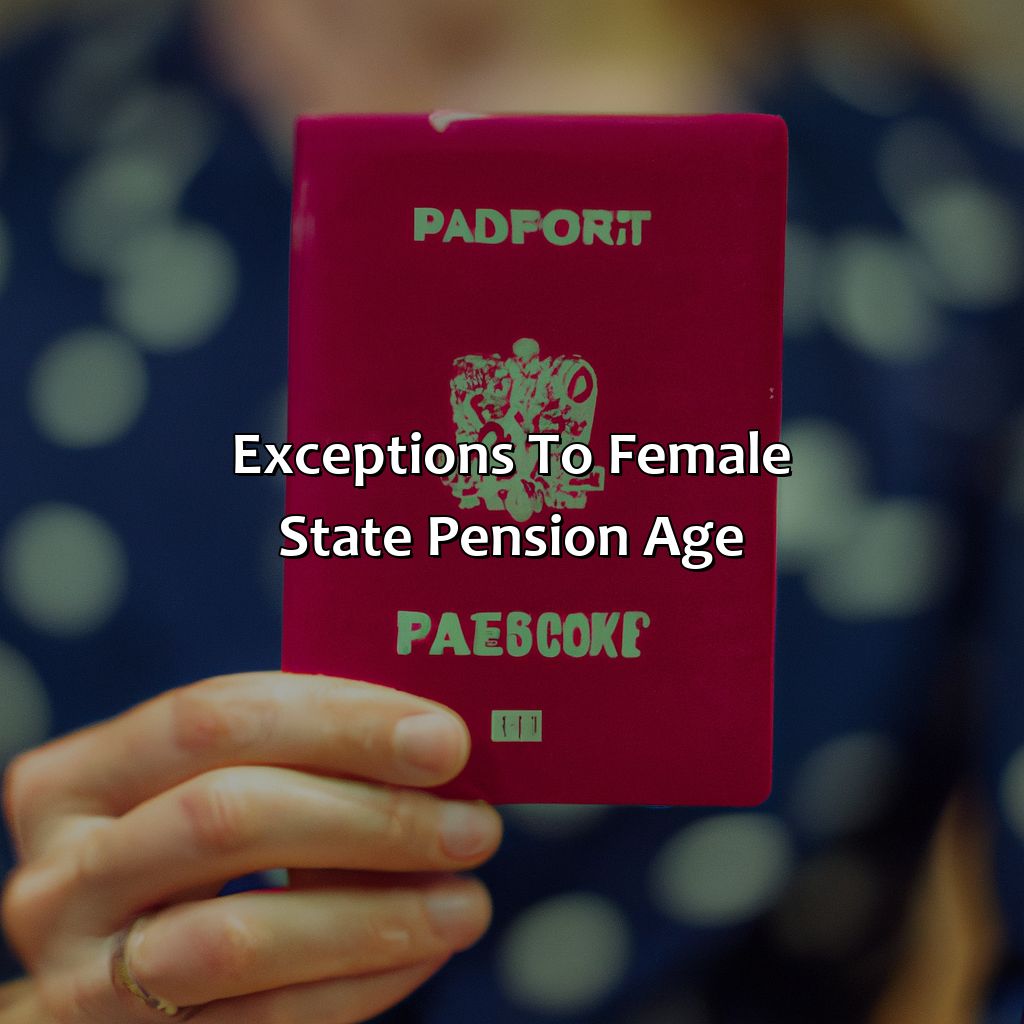
Image credits: retiregenz.com by Yuval Washington
Widow’s State Pension
The “Survivor Benefits Pension” is a state pension paid to the spouse or civil partner of someone who has passed away. It provides financial support to widows who may be struggling financially without their partner’s income. The amount received depends on the deceased partner’s National Insurance contributions, and it is usually payable from when the widow reaches state pension age.
While the rules for survivors’ pensions have changed in recent years, one thing has remained consistent: the pension amount is affected by a number of factors beyond just the age at which you claim it. For example, if you remarry or form a new civil partnership before reaching State Pension Age, and your new partner was born on or after 6 April 1950, you will not get a survivor’s pension based on your late spouse’s National Insurance contributions.
It is worth noting that some exceptional circumstances may allow people to start receiving their Widow’s State Pension earlier than normal. For instance, if they are suffering from serious health issues or if they have dependents under 16 whom they care for in their own right.
According to GOV.UK, if your husband, wife or civil partner died aged 18 or over and you are not widowed again before you reach State Pension age then you might be able to inherit an extra payment on top of your new State Pension called the bereavement allowance; this benefit lasts for up to 52 weeks after the person passed away.
Sources say that women can receive up to EU 62,407 per year as part of their Survivor Benefits Pension depending upon individual factors like how many years she and her spouse/civil-partner contributed National Insurance contributions.
When it comes to losing a loved one, the only benefit you’ll receive is a reminder of how short life really is.
Bereavement Benefits
Bereavement Allowance: This benefit is provided to widows and widowers who are 45 and above, but below the State Pension age. It provides a weekly payout for up to 52 weeks after the spouse’s death.
Additional benefits may be claimed by those who were pregnant at the time of their spouse’s death or had dependent children when their spouse expired. Payments may also be made if the deceased paid enough National Insurance contributions. If you’re wondering how long pension is paid after death, it depends on factors such as the type of pension and when the pensioner passed away.
For those who have missed out on claiming these allowances, it is never too late to take action. Contacting the Department of Work and Pensions can provide clarity on any unpaid benefits that could make a difference in one’s daily life. Don’t miss out on when old age pension is paid in December.
Five Facts About the Female State Pension Age:
The current female state pension age in the UK is 65. (Source: Gov UK)
The female state pension age is set to increase to 66 by October 2020. (Source: Money Advice Service)
The female state pension age is scheduled to rise again to 67 between 2026 and 2028. (Source: Gov UK)
The changes to the female state pension age have been controversial and have been subject to legal challenges. (Source: BBC News)
Women born in the 1950s have been particularly affected by the changes to the female state pension age, with some experiencing financial hardship as a result. (Source: The Guardian)
FAQs about What Is The Female State Pension Age?
What is the female state pension age?
The female state pension age is the age at which women in the United Kingdom become eligible to receive the state pension.
What is the current female state pension age?
The current female state pension age is 65 years old.
Is the female state pension age going up?
Yes, the female state pension age is gradually increasing from 65 to 66, and then to 67 by 2028.
When will the female state pension age increase?
The female state pension age is currently increasing from 65 to 66 between November 2018 and October 2020, and then it will increase again to 67 between 2026 and 2028.
Can women still claim the state pension before the female state pension age?
Women can start claiming the state pension from the age of 63, but this will be at a reduced rate compared to if they wait until the female state pension age.
Does the female state pension age apply to everyone?
The female state pension age applies to women who were born after April 5, 1950. Women who were born before this date have a different state pension age.
 Checkout this IRS Loophole
Checkout this IRS Loophole 
